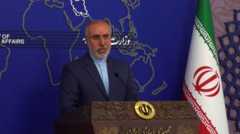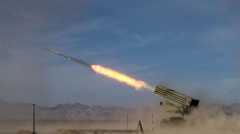Israel's allies have urged it to avoid any escalation, as it considers a response to Iran's unprecedented missile and drone attack
- Tehran launched more than 300 projectiles at Israel on Saturday, in what it said was retaliation for a strike on its consulate in Syria
- Germany's foreign minister, Annalena Baerbock, called for calm
- President Emmanuel Macron says France will do everything possible to avoid a regional conflagration
- David Cameron, the UK foreign secretary, tells the BBC Iran's attack had almost entirely failed, and Israel should be "smart as well as tough"
- Cameron also insists the UK's efforts are focused on ensuring a pause in fighting and getting aid into Gaza
- The UN continues to warn that famine is imminent in parts of Gaza.
Tehran has called on Western nations to "appreciate Iran's restraint" towards Israel after it attacked the country on Saturday in retaliation for a deadly strike on its consulate in Damascus, Syria.
Iran launched more than 300 drones and missiles towards Israel but some 99% of the barrage was intercepted, Israeli officials have since said.
"Instead of making accusations against Iran, [Western] countries should blame themselves and answer to public opinion for the measures they have taken against the ... war crimes committed by Israel" in its war in Gaza, Iranian foreign ministry spokesman Nasser Kanani said earlier.
Kanani added that Western countries "should appreciate Iran's restraint in recent months".
All eyes are on Israel to see how it responds to Iran's weekend drone and missile attack but its allies have urged it to avoid escalation.
German Foreign Minister Annalena Baerbock says Israel "has won defensively" in its quarrel with Iran, and there must not be an escalation in the region.
French President Emmanuel Macron joins calls for calm and says his country will do everything possible to avoid an escalation.
And as we reported earlier, UK Foreign Secretary David Cameron told the BBC he thought Israel was "perfectly justified" to respond to Iran - but urged the country to be careful and "think with its head, not heart".
As well as Israel's allies, countries considered to be more closely aligned with Iran have urged both sides to show restraint.
Russia refrained from publicly criticising Iran over the attack, but shared concern over the risk of escalation.
"Further escalation is in no one's interests," Kremlin spokesman Dmitry Peskov said of the war in the Middle East.
China’s foreign ministry also called for calm and to "exercise restraint and avoid further escalation of tensions".
Iran is much bigger than Israel geographically and has a population of nearly 90 million, almost 10 times as big as Israel's - but this does not translate into greater military power.
Iran has invested heavily in missiles and drones. It has a vast arsenal of its own but has also been supplying significant amounts to its proxies - the Houthis in Yemen and Hezbollah in Lebanon.
What it lacks is modern air defence systems and fighter jets. Russia is believed to be co-operating with Iran to improve those, in return for the military support Tehran has provided Moscow in its war with Ukraine - largely in the form of Shahed drones which the Russians are reportedly now manufacturing themselves.
By contrast, Israel has one of the most advanced air forces in the world. According to the IISS military balance, Israel has at least 14 squadrons of jets - including F15, F16 and the latest F-35 stealth jets.
Israel also has experience of conducting strikes deep inside hostile territory.
THESE AND MORE UPDATES AT: Iran Israel latest: Western allies call on Israel to avoid escalation - BBC News



No comments:
Post a Comment